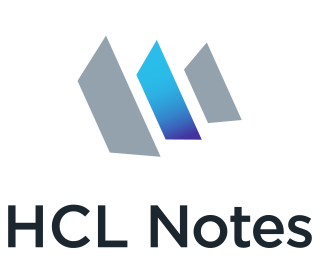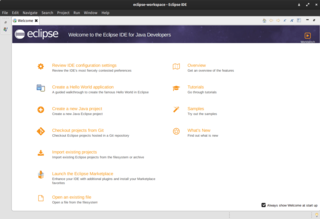
OSGi is an open specification and open source project under the Eclipse Foundation.

Jakarta EE, formerly Java Platform, Enterprise Edition and Java 2 Platform, Enterprise Edition (J2EE), is a set of specifications, extending Java SE with specifications for enterprise features such as distributed computing and web services. Jakarta EE applications are run on reference runtimes, which can be microservices or application servers, which handle transactions, security, scalability, concurrency and management of the components they are deploying.

HCL Notes is a proprietary collaborative software platform for Unix (AIX), IBM i, Windows, Linux, and macOS, sold by HCLTech. The client application is called Notes while the server component is branded HCL Domino.

Eclipse is an integrated development environment (IDE) used in computer programming. It contains a base workspace and an extensible plug-in system for customizing the environment. It is the second-most-popular IDE for Java development, and, until 2016, was the most popular. Eclipse is written mostly in Java and its primary use is for developing Java applications, but it may also be used to develop applications in other programming languages via plug-ins, including Ada, ABAP, C, C++, C#, Clojure, COBOL, D, Erlang, Fortran, Groovy, Haskell, HLASM, JavaScript, Julia, Lasso, Lua, NATURAL, Perl, PHP, PL/I, Prolog, Python, R, Rexx, Ruby, Rust, Scala, and Scheme. It can also be used to develop documents with LaTeX and packages for the software Mathematica. Development environments include the Eclipse Java development tools (JDT) for Java and Scala, Eclipse CDT for C/C++, and Eclipse PDT for PHP, among others.

WebObjects is a discontinued Java web application server and a server-based web application framework originally developed by NeXT Software, Inc.
XForms is an XML format used for collecting inputs from web forms. XForms was designed to be the next generation of HTML / XHTML forms, but is generic enough that it can also be used in a standalone manner or with presentation languages other than XHTML to describe a user interface and a set of common data manipulation tasks.

The Standard Widget Toolkit (SWT) is a graphical widget toolkit for use with the Java platform. It was originally developed by Stephen Northover at IBM and is now maintained by the Eclipse Foundation in tandem with the Eclipse IDE. It is an alternative to the Abstract Window Toolkit (AWT) and Swing Java graphical user interface (GUI) toolkits provided by Sun Microsystems as part of the Java Platform, Standard Edition (J2SE).

Apache Geronimo is an open source application server developed by the Apache Software Foundation and distributed under the Apache license.
WebSphere Application Server (WAS) is a software product that performs the role of a web application server. More specifically, it is a software framework and middleware that hosts Java-based web applications. It is the flagship product within IBM's WebSphere software suite. It was initially created by Donald F. Ferguson, who later became CTO of Software for Dell. The first version was launched in 1998. This project was an offshoot from IBM HTTP Server team starting with the Domino Go web server.

GlassFish is an open-source Jakarta EE platform application server project started by Sun Microsystems, then sponsored by Oracle Corporation, and now living at the Eclipse Foundation and supported by OmniFish, Fujitsu and Payara. The supported version under Oracle was called Oracle GlassFish Server. GlassFish is free software and was initially dual-licensed under two free software licences: the Common Development and Distribution License (CDDL) and the GNU General Public License (GPL) with the Classpath exception. After having been transferred to Eclipse, GlassFish remained dual-licensed, but the CDDL license was replaced by the Eclipse Public License (EPL).
Service Data Objects is a technology that allows heterogeneous data to be accessed in a uniform way. The SDO specification was originally developed in 2004 as a joint collaboration between Oracle (BEA) and IBM and approved by the Java Community Process in JSR 235. Version 2.0 of the specification was introduced in November 2005 as a key part of the Service Component Architecture.
Business intelligence software is a type of application software designed to retrieve, analyze, transform and report data for business intelligence (BI). The applications generally read data that has been previously stored, often - though not necessarily - in a data warehouse or data mart.
iBATIS is a persistence framework which automates the mapping between SQL databases and objects in Java, .NET, and Ruby on Rails. In Java, the objects are POJOs. The mappings are decoupled from the application logic by packaging the SQL statements in XML configuration files. The result is a significant reduction in the amount of code that a developer needs to access a relational database using lower level APIs like JDBC and ODBC.
JasperReports is an open source Java reporting tool that can write to a variety of targets, such as: screen, a printer, into PDF, HTML, Microsoft Excel, RTF, ODT, comma-separated values (CSV), XSL, or XML files.

JFire was an enterprise resource planning and customer relationship management system.
EclipseLink is the open source Eclipse Persistence Services Project from the Eclipse Foundation. The software provides an extensible framework that allows Java developers to interact with various data services, including databases, web services, Object XML mapping (OXM), and enterprise information systems (EIS). EclipseLink supports a number of persistence standards including:
JBoss Tools is a set of Eclipse plugins and features designed to help JBoss and JavaEE developers develop applications. It is an umbrella project for the JBoss developed plugins that will make it into JBoss Developer Studio.
JBoss Developer Studio (JBDS) was a development environment created and developed by JBoss and Exadel.










